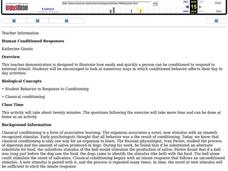Curated OER
Learned Behaviors
For this learned behaviors worksheet, students will learn the steps that Pavlov took in conditioning dogs to drool when they heard a bell. Students will then complete 2 short answer questions based on Pavlov's experiment.
Curated OER
An Incredible Journey: Exploring Brave New Worlds
High schoolers, after reading the novel, Brave New World, research in depth topics like the production and consumption of Henry Ford, Pavlov's and Skinner's behavioral science work, as well as the existence of Utopian and dystopian...
Curated OER
Human Conditioned Responses
High schoolers participate in a demonstration designed to illustrate how easily and quickly a person can be conditioned to respond to external stimuli. Students look at numerous ways in which conditioned behavior affects their day to day...
Curated OER
Learned Behavior
In this learned behavior worksheet, students review different types of learned behavior including habituation and trial-and-error learning. This worksheet has 7 short answer, 8 matching, and 10 fill in the blank questions.
Curated OER
Principles of Classical Conditioning
Twelfth graders examine the concept of classical conditioning. They listen to a lecture about the principles of classical conditioning and the basic response and stimulus experiment conducted by Pavlov. Students discuss and identify...
Nobel Media AB
The Nobel Prize: Pavlov's Dog
You have to use the principles behind Pavlov's conditioning experiments in order to play this game and get the dog to drool when he hears a sound. You can also get more information about Ivan Pavlov and his research.
Sonoma State University
Sonoma State University: Pavlov and Classical Conditioning
Website offers a brief biography of Pavlov and describes his Classical Conditioning model.








